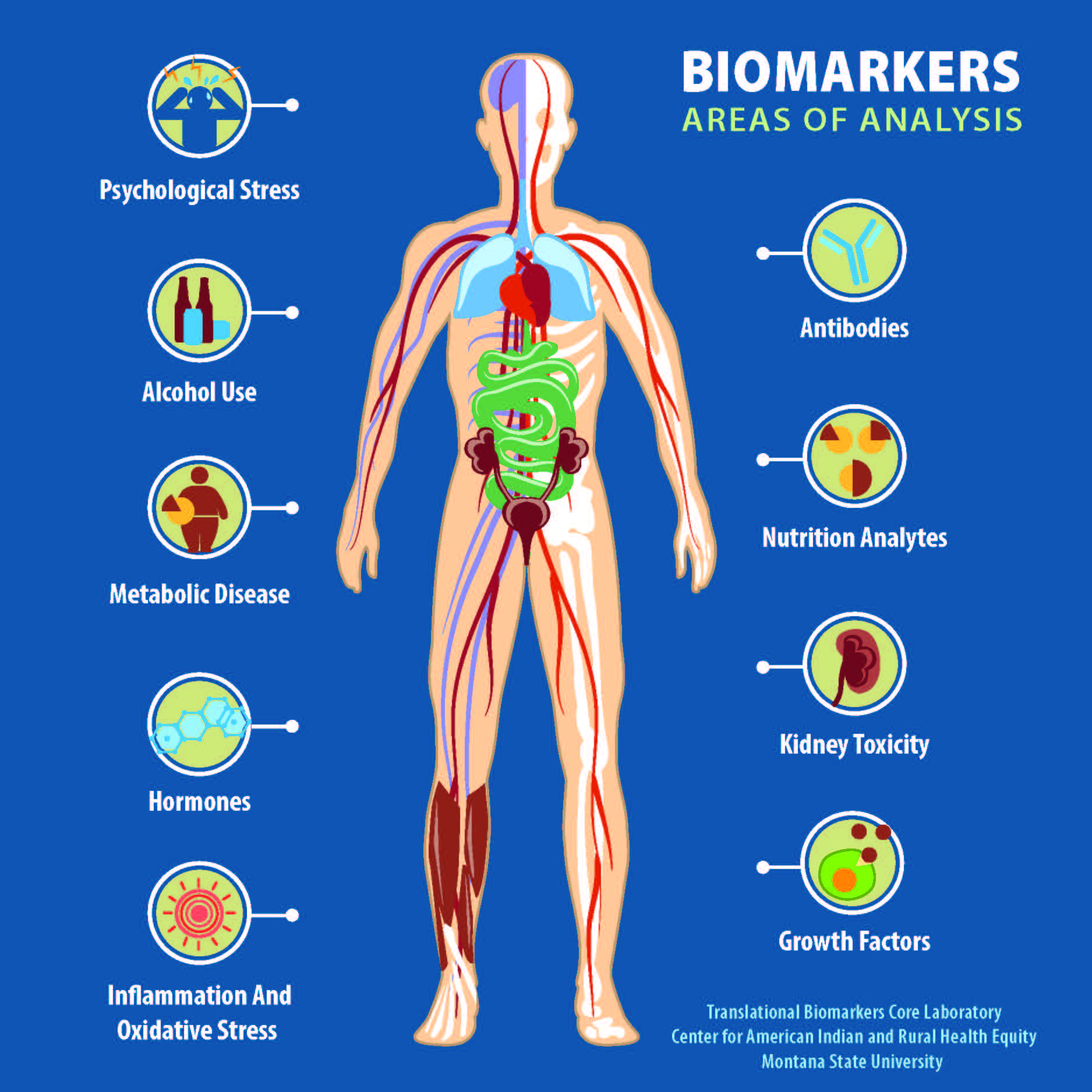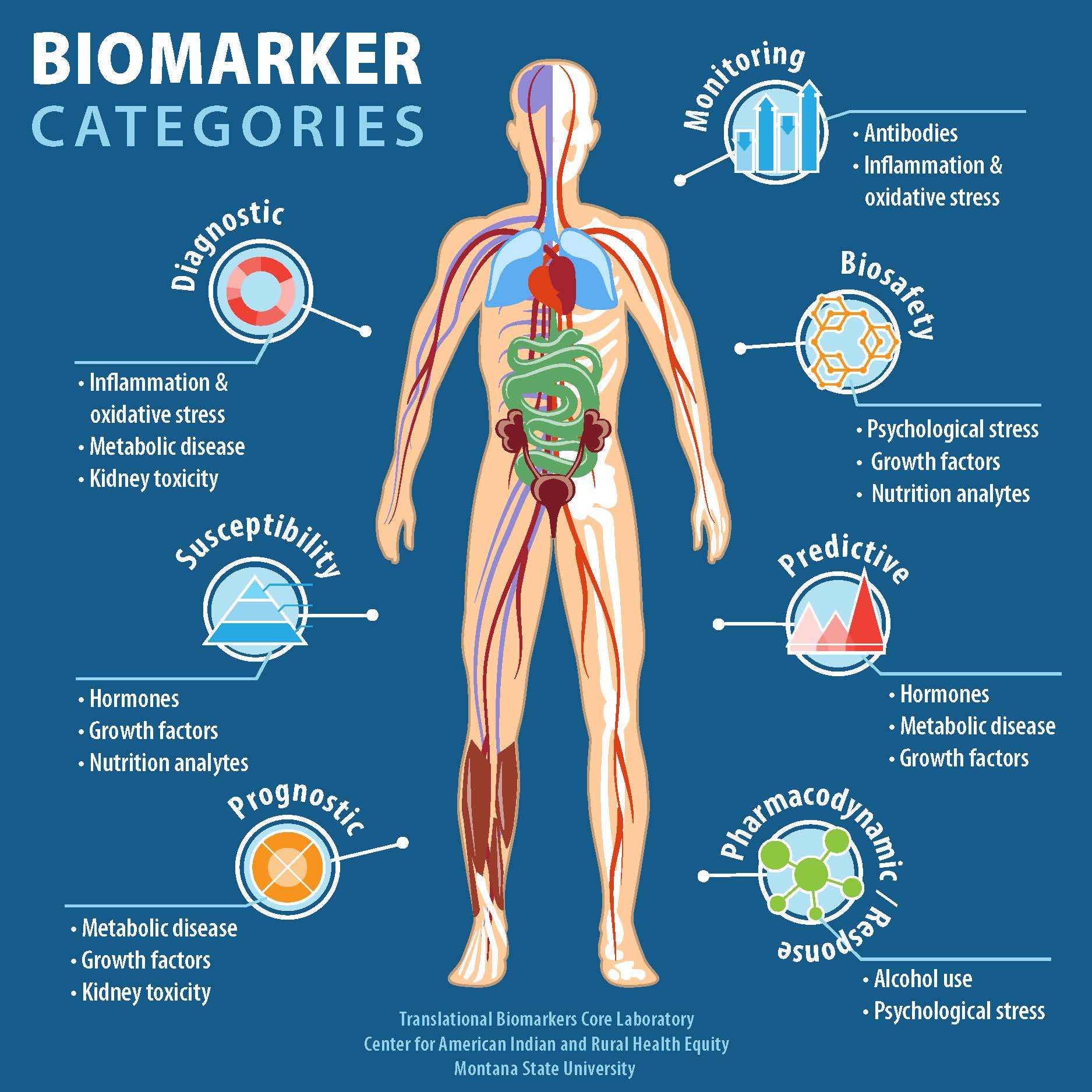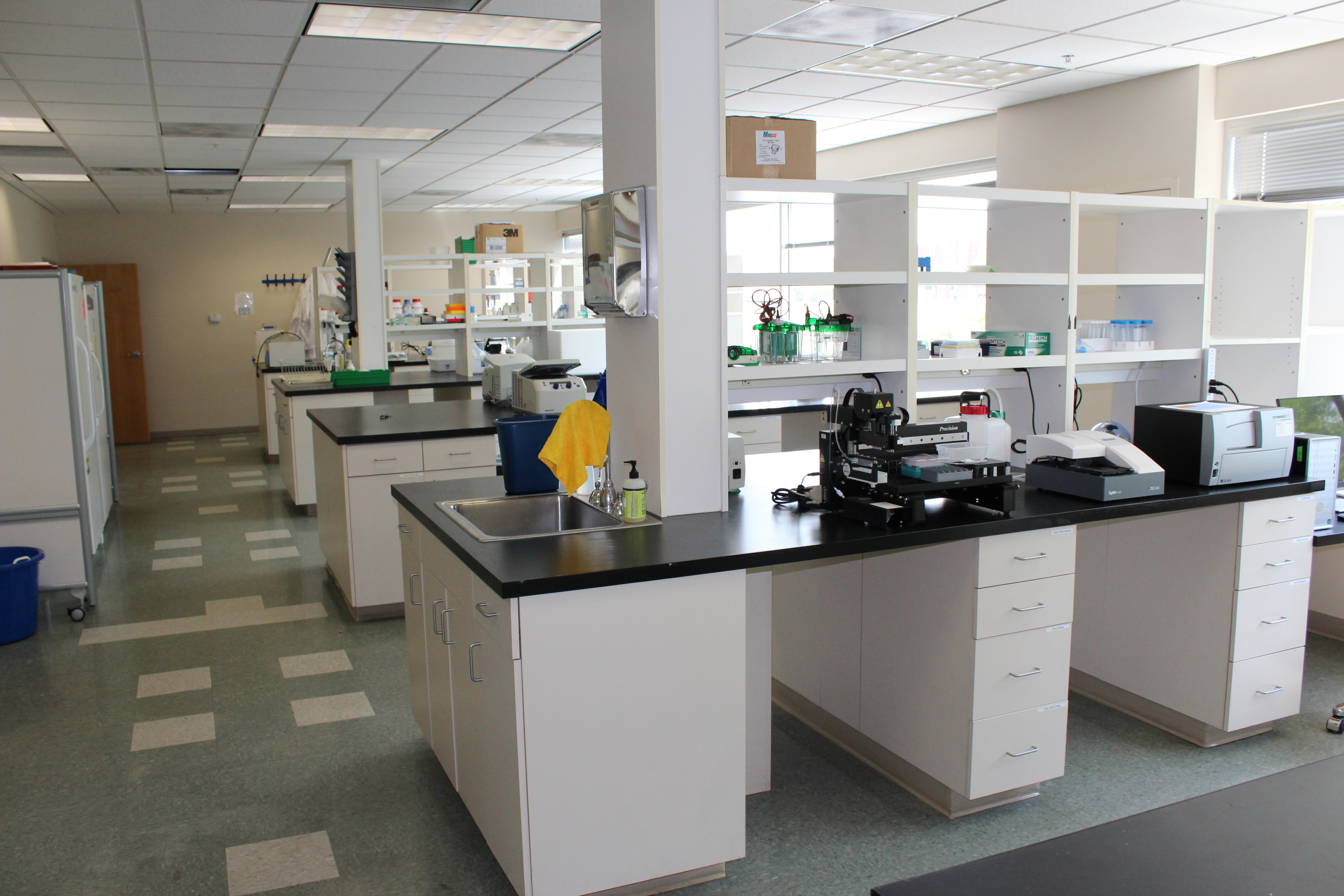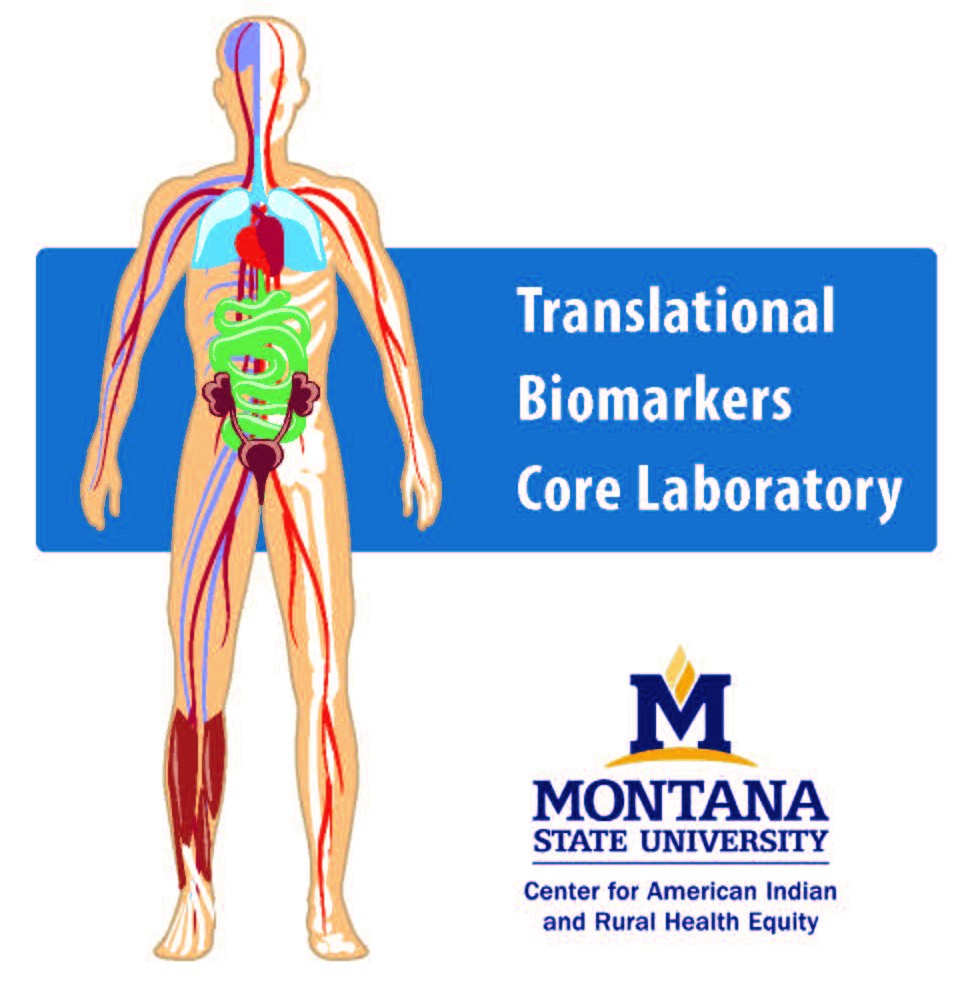Translational Biomarkers Core

Biomarkers are indicators of a biological state that provide a standardized, valid, and precise way of evaluating environmental exposure, effect, or susceptibility, diagnosis, or progression of disease and infection. Biomarkers can be biological, physical, or chemical, and they are measurable parameters in an organism indicative of a specific biological state. Biomarkers are biomolecules that can be categorized into carbohydrates, proteins, hormones, enzymes, lipids, nutrients, genetic material (DNA and RNA), and more.
A key challenge in public health studies is to identify health disparities and to evaluate associated lifestyle behaviors and environmental exposure to a high level of validity and reliability. The measurement of validated biomarkers can improve the quality and reliability of observational studies and those using self-reported data on the role of lifestyle factors for impacting chronic disease and human health.

The Translational Biomarkers Core (TBC) provides state-of-the-art services to assess a wide range of biomarkers related to public health research that include inflammation, oxidative stress, hormones, psychological stress, metabolic disease, growth factors, kidney toxicity, alcohol use, and nutrition analytes.
Operated by the Center for American Indian and Rural Health Equity the TBC Lab (below) offers multidisciplinary cutting-edge biomedical research services by providing facilities,
advanced instrumentation,
Additional services are provided in collaboration with the Montana INBRE Bioinformatics and Biostatistics Core, which can assist investigators with statistical analysis and experimental design.
To summarize, the TBC's goals are:
- To provide facilities, equipment, and resources that enable researchers to investigate diet, lifestyle, and chronic disease biomarkers that include assessments of inflammation, oxidative stress, hormones, metabolic disease, growth factors, kidney toxicity, and drug and alcohol use.
- To provide training and consultation for researchers on services available in the TBC.
- To provide facilities and training for biospecimen processing.
- To expand research tools, standardize key methodologies, and introduce the newest techniques available to investigators.
For more information, email Core Director Dr. Stephen Martin at [email protected], or call 406-994-3287.

Biomarker Evaluation
- Consulting services: Consulting with investigators to determine suitable methods for evaluating diet, lifestyle, and chronic disease biomarkers including assessments of inflammation, oxidative stress, hormones, metabolism, growth factors, kidney toxicity, alcohol/drug use, and nutrition analytes.
- Analytical services: Quantification of biomarkers from human or animal samples using a range of analytical methods including ELISA procedures, enzymatic assays, fluorescence, immunoassays, flow cytometry, chromatography, and gene expression analyses.
Supporting Services
- Sample management: Development of standard operating procedures for sample collection, processing, and temporary storage.
- Analytical development and design: Assay validation and development of standard operating procedures for research protocols.
- Interpretation of biomarker results: Support with interpretation of results.
The Core Lab houses state-of-the art instrumentation to enhance the research of investigators carrying out a diverse range of public health studies. Some examples of Lab instrumentation include:
| Equipment | Function |
| Bio-Plex 200 System | An automated immunoassay multiplex array system that provides a wide range of biomarker assessments. |
| Bio-Tek Synergy HT Multi-Mode Microplate Reader | A flexible monochromator-based multi-mode plate reader that includes Fluorescence Intensity (FI), Fluorescence Polarization (FP), Time-Resolved Fluorescence (TRF), Luminescence, and UV-visible Absorbance. |
| Beckman Coulter CytoFLEX Flow Cytometer | For multiple assessments including cell proliferation analysis, T cell subset analysis, identification of low expressed antigens, and micro-particle detection. |
| Waters ACQUITY Arc System (Dual HPLC and UPLC) with Detector | For quantification of nutrients and metabolites including Vitamins A, B, C, D, E; carbohydrates (glucose, fructose, sucrose); dietary fiber; lignans; fatty acids; polyphenols; alkaloids; and terpenoids. |
| Bio-Tek Precision XS Automated Pipetting System | A high-throughput robotic and an automated pipetting instrument. |
| For sample preparation and the preservation and storage of biologicals, pharmaceuticals, and foods. | |
| Eppendorf Mastercycler Nexus Gradient ThermoCycler | Used to amplify segments of DNA via the polymerase chain reaction (PCR). |
| Other Minor Equipment | In addition to the aforementioned major analytical equipment, the TBCL offers a wide range equipment and facilities that include 2 refrigerated centrifuges, 3 freezers (including two -80°F ultra-low freezers), a refrigerator, a rotary evaporator, an orbital shaker, a microplate shaker, shaking water baths, 4 vortexes, 2 sonicators, 3 analytical balances, a cell culture hood, 2 incubators, a heating and drying oven, a colony counter, a benchtop pH meter, a titration system, GPS trackers, a portable spectrocolorimeter, and a high-resolution gel electrophoresis system. |
Hands-on training sessions are offered by the TBCL. The goal of the training is to expand facility access and provide knowledge to researchers with little previous training in biomarker analyses. Please contact the TBCL to arrange training.
Acknowledgment
Lab users must acknowledge TBCL/CAIRHE (NIH grant # P30GM154593) in any grant application or publication in which equipment and/or staff expertise was provided. Suggested language is as follows:
Research reported in this publication was supported by the National Institute of General Medical Sciences of the National Institutes of Health under Award Number P30GM154593.
Please send the TBCL director a copy of accepted publications containing data generated in the facility.
Authorship
TBCL staff will be listed as manuscript co-authors for projects in which they provide consultation. This will be agreed upon in writing prior to laboratory services being conducted. Publication record is essential to ensure a high-quality core facility and for the professional development of its staff. Please follow the link below to the Association of Biomolecular Resources Facilities (ABRF) site for guidance on including core facility personnel as co-authors in publications. https://abrf.org/authorship-guidelines
Training
Hands-on training sessions are offered by the TBCL. The goal of the training is to expand facility access and provide knowledge to researchers with little previous training in biomarker analyses. Please contact the TBCL to arrange training.
Prices and Fees
Please contact the TBCL for up-to-date prices and fees.
Please email Core Director Dr. Stephen Martin at [email protected] for up-to-date prices and fees for training, instrument usage, and analytical services.



